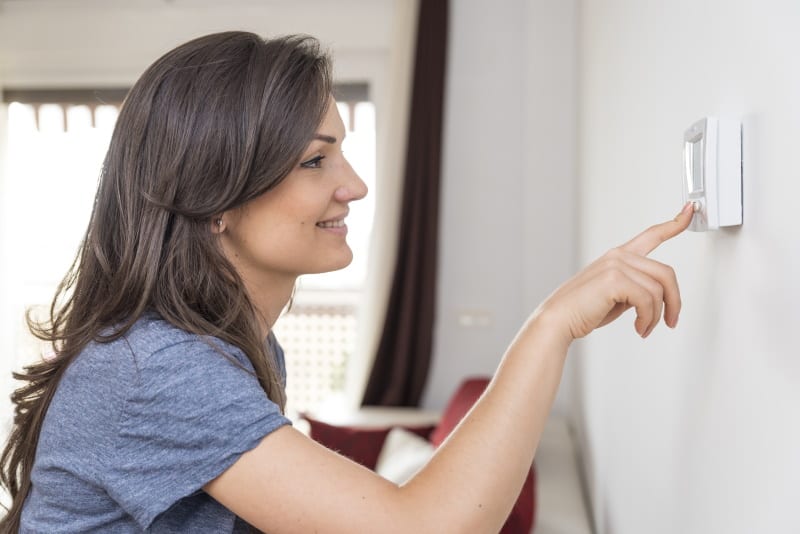Does Turning Off Heat at Night Save Money?
This post may contain affiliate links. Please read how we make money for more information.
Is your heating bill a little on the high side when the weather is cold? If so, you may be wondering: does turning off heat at night save money? It sounds logical, after all, that you won’t need to run your heater if you are bundled up under several layers of blankets while you are sleeping.
Turning your heat off during cold weather is not recommended. It could result in burst pipes and poor sleep quality. Turning your heat down instead of off is a better option.
Let’s take a look at a couple of things to watch out for with turning your heat off at night. Then we’ll look at a few ways you can save some additional money on your energy costs.
Table of Contents
Your Pipes May Freeze
Turning off your heat at night to save money could cause your pipes to freeze and burst if it’s cold enough. This could result in a very expensive repair bill, which negates the reason for turning your heat off in the first place – to save money.
It May Negatively Affect Your Sleep
Another thing to consider with turning your heat off at night to save money is that it could result in a poor night’s rest. If you aren’t warm enough while you are sleeping, it could cause you to wake up a lot or toss and turn throughout the night. This could cause you to feel sluggish and tired the next day.
Turn Your Heat Down Instead of Off
Does turning off heat at night save money?
A better alternative is to turn your heat down instead of off.
According to the U.S. Department of Energy, you may be able to save as much as 10% a year on your home’s energy costs by turning down your thermostat 7-10 degrees for eight hours a day from where you normally keep it when the weather is cool or cold.
That’s not a small amount of money. For most families, home heating costs represent a significant amount of their monthly energy costs.
Turning your heat down while you sleep is one way to do this. You may also want to consider turning your heat down a few degrees if no one is going to be home for a while. There’s no need to heat a home to 72 degrees if you are at work, school, or somewhere else.
Another way to save on energy costs during cool or cold weather is to lower the heat in your home to 68 degrees when you are home. Just wear some warm clothes like a sweatshirt or something else to help you stay comfortable.
It’s also important to point out that you may also be able to save money on home cooling costs during the summer by adjusting your thermostat so that it’s a few degrees warmer than usual. You can use fans and wear cool clothing to compensate.
Additional Ways to Save Money on Home Energy Costs
The energy that powers our homes isn’t cheap. Regardless of whether you are using electricity, gas, or both, there are some other things you may be able to do to lower your home energy costs. Small savings here and there could add up to some big savings on your utility bills.
1. Adjust the Temperature on Your Hot Water Heater
Many hot water heaters are turned up higher than they need to be. You may be able to save money on energy by lowering the temperature of your hot water heater a few degrees. You may have to adjust the temperature a few times to make sure the water is neither too hot nor too cold.
2. Use a Low-Flow Shower Head
By switching to a low-flow shower head, you may be able to save on hot water energy costs. This may also help you save on your water bill. Using less water isn’t just about saving money on energy costs, you’ll also be doing your part to help the environment by conserving water.
3. Wash Clothes in Cold Water
Another way to save money on hot water energy is to wash your clothes in either cold or warm water. Washing machines use a lot of water, and by reducing the amount of hot water you use per load, the savings can really add up over time.
4. Switch to LED Bulbs
Are you still using incandescent bulbs in the lamps and light fixtures in your home? If so, you may be able to save money on energy by switching to modern LED bulbs.
Incandescent bulbs have been around for decades and are terribly inefficient. LED bulbs, in comparison, use just a fraction of the electricity.
Although LED bulbs cost much more than incandescent bulbs, switching to them is often worth it because they last much longer. Most incandescent bulbs only last 1,000-2,000 hours each. LED bulbs, in comparison, last 10,000-50,000 hours. This is an important consideration for bulbs that are in fixtures that are hard to get to.
5. Run Appliances Late at Night
Did you know that electricity is cheaper during certain times? It’s true. Utility companies usually charge more for electricity during peak hours when demand is high and lower rates when there is less demand, like late at night.
You can take advantage of this by doing your laundry, running your dishwasher, and other things late at night. You could take care of these things shortly before you go to bed, for example, to save as much as possible on energy.
6. Unplug Everything You Aren’t Using
Did you know that many electronic devices continue to use electricity even when turned off? That’s because they often have a “standby mode.” Many devices are designed to go into standby mode when powered off so that they can very quickly turn back on again when needed.
The problem with standby modes, of course, is that these electronic devices continue to use electricity when turned off. The only way to ensure that they are truly off is to unplug them.
Another thing to watch out for is an electronic device that has an electronic clock, LED display, or light. These devices will continue to use electricity when turned off.
A few electronic devices that may continue to use electricity when turned off include:
- Microwave ovens
- DVD players
- TVs
- TV cable boxes
- Computers
- Computer monitors
7. Use Ceiling Fans
If your home has ceiling fans, definitely take advantage of them. They use much less electricity than air conditioners and, although they don’t lower the temperature in a room, they will make the room feel cooler. That may be enough to forego using a power-hungry air conditioner.
8. Check Seals on Windows and Doors
When I was growing up, my dad would often tell me to close the door because he could “see dollar bills flying out the door.” He was referring, of course, to letting all of the cool air out of the house during the hot summer days.
If you have leaky seals on your doors and windows, your HVAC system may have to work a lot harder to cool your home in the summer and heat it in the winter. You may be able to save on energy by checking the seals on your windows and doors for leaks and fixing any problems you find.
9. Repair Leaky Air Ducts
Modern HVAC systems use networks of air ducts to transport the heated or cooled air they create to various parts of homes. Sometimes these ducts are routed through areas of your home that you don’t want to heat or cool, like crawl spaces or attics.
If you have a leak in an air duct, you may heating or cooling your attic, crawl space, or the air could even be escaping outside of your home. By periodically checking your air ducts and repairing them, you may be able to prevent these leaks so your HVAC unit doesn’t have to work as hard.
10. Do an Energy Audit
Another way to find air leaks in your home is to have an energy audit done. Some utilities offer this service. There are independent companies that do this, too.
An energy auditor will inspect both your home’s interior and exterior using sophisticated monitoring equipment to identify air leaks.
Saving Money on Energy
Heating and cooling homes is expensive. It takes a lot of money to run the air conditioners and HVAC units that keep us warm in the winter and cool in the summer. But that doesn’t mean there aren’t ways you can save money on this expense.
Does turning off heat at night save money?
If the weather is cold outside, there is a very real danger that the pipes inside your home may freeze, thus resulting in a very expensive repair bill.
Instead of turning your heat off at night, turning your heat down is a better option. This may help you to sleep better, too.







